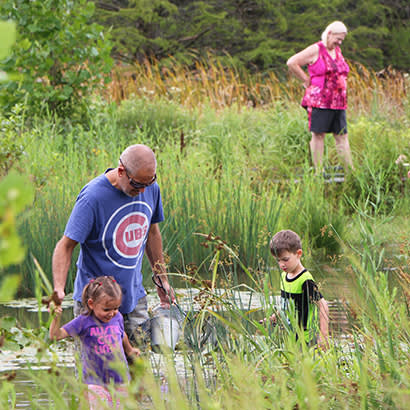
For an enhanced digital experience, read this story in the ezine.
Each year, NRPA’s Research team surveys the public to understand better how they connect with parks and recreation. The resulting Engagement With Parks Report highlights how local parks and recreation facilities impact the lives of every person in our nation.
The ubiquity of parks and recreation is evident in the number of people visiting these spaces and how often they do it. Eighty-three percent of survey respondents — the equivalent of 275 million people — visited a local park or recreation facility at least once during the 12 months ending in May 2022. On average, people visited 22 times — or nearly twice a month — between June 2021 and May 2022.
Five in six U.S. adults indicate proximity to high-quality parks, playgrounds, open spaces or other recreation facilities is important when choosing a neighborhood to live in. Nearly 60 percent cite distance to these features as “extremely” or “very” important.
Proximity also plays a role in how people travel to these destinations. While most people travel by automobile to parks, playgrounds, open spaces or recreation centers, walking also is a mode of transportation for half of U.S. adults. Other methods include:
- Biking (cited by 22 percent of respondents)
- Jogging/Running (16 percent)
- Public transit, such as buses, trains or subways (8 percent)
- Taxi/Rideshare (7 percent)
Parks and Recreation Is Vital
Nine in 10 U.S. adults agree parks and recreation is an important service provided by their local governments, with robust support spanning every segment of the population:
- Generation – Gen Zers (81 percent), millennials (90 percent), Gen Xers (91 percent), baby boomers (93 percent)
- Race and ethnicity – Those who identify as non-white (84 percent), those who identify as white (91 percent) and those who identify as Hispanic (88 percent)
- Household formation – Households with children (94 percent)
- Political views – Democrats (94 percent), Republicans (88 percent), Independents (85 percent)
People understand and appreciate parks and recreation’s greater mission. For example, NRPA’s Three Pillars represent what they want as the guiding principles for their local park and recreation agency. Nearly equal shares of survey respondents view each pillar as a critical agency function.
Parks and Recreation Going Beyond Its Traditional Role
People also want their local park and recreation agencies to continue broadening their services to meet our communities’ many challenges. Nine in 10 survey respondents agree that providing emergency shelter in their facilities and serving as distribution points for essential supplies to community members in the event of extreme weather or natural disasters is an important role for park and recreation agencies to play. Ninety percent of survey respondents also agree on the importance of their parks and recreation providing job and volunteer opportunities for youth and young adults, such as lifeguarding jobs, camp counselor roles and junior ranger roles.
U.S. adults also want their local park and recreation agency to:
- Deliver programming and support that improve community physical and mental health (cited by 89 percent of respondents)
- Reduce the impact of extreme temperatures through the planting of trees and other vegetation (89 percent)
- Develop and maintain parks and open spaces to minimize the impacts of flooding (88 percent)
- Offer before- and/or after-school childcare and summer camps for youth (85 percent)
The 2022 Engagement With Parks Report demonstrates that the public views parks and recreation as vital to their lives and an essential local government service. The more than 10,000 local park and recreation agencies in the United States make their communities robust, healthy and resilient. Their emphasis on conservation, equity, and health and wellness — as well as their ability to deliver effective solutions to the many challenges facing those communities — highlights how parks and recreation is not a luxury; it is essential infrastructure in our cities, towns and counties.
Kevin Roth is Vice President of Research, Evaluation and Technology at NRPA.

